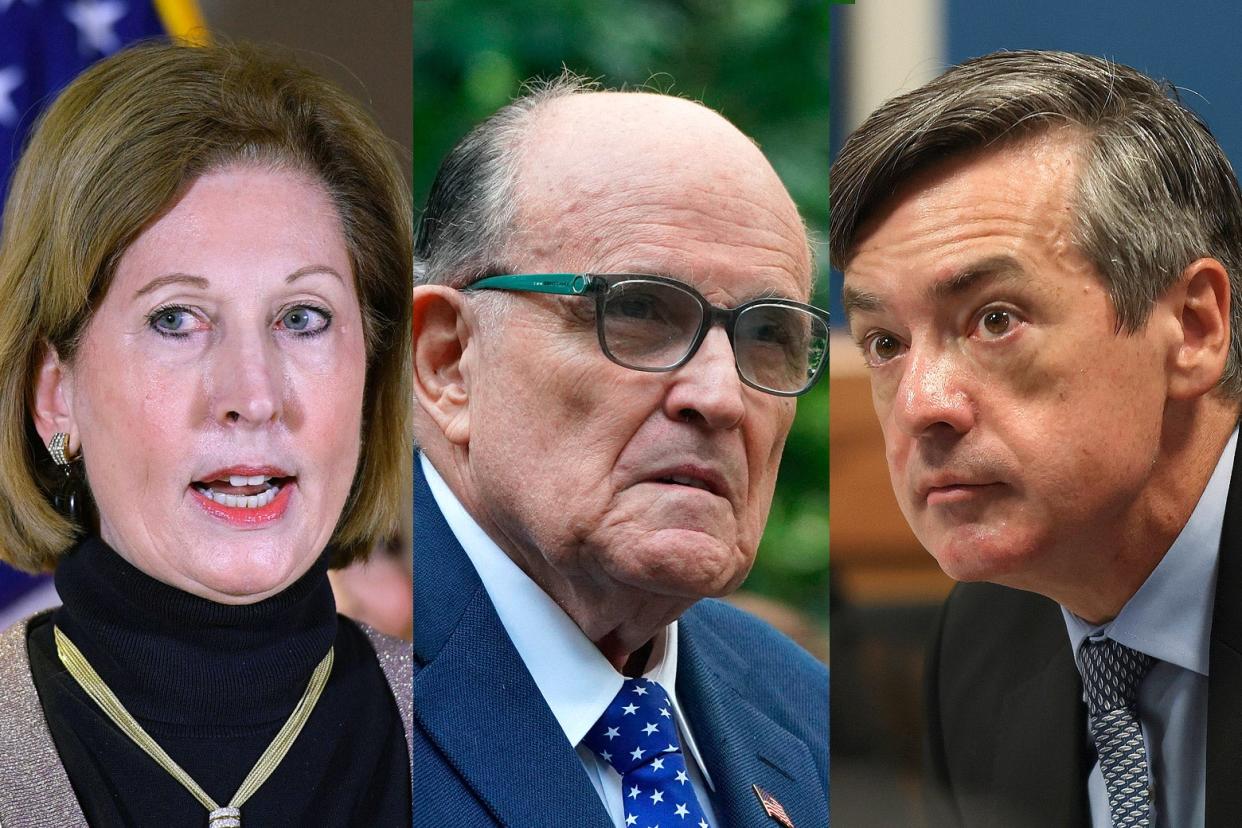The Chesebro and Powell Guilty Pleas Torch Trump’s Planned Defense

- Oops!Something went wrong.Please try again later.
- Oops!Something went wrong.Please try again later.
- Oops!Something went wrong.Please try again later.
On Friday, Kenneth Chesebro pleaded guilty to one count of conspiracy to file false documents in the Fulton County 2020 election conspiracy case, becoming the second high-level Donald Trump co-defendant to become a state’s witness in two days. Chesebro received an especially lenient sentence of five years’ probation, a small financial penalty, and 100 hours of community service.
With the guilty plea and cooperation deal Georgia prosecutors struck on Thursday with Team Trump attorney Sidney Powell, Chesebro’s plea deal should be viewed as an earthquake in the case against Trump. Given Powell’s close proximity to the former president and his legal advisers at crucial times in his attempts to overturn the 2020 election, her testimony will be particularly devastating not only as to defendant Trump, but to co-defendants Rudy Giuliani and John Eastman.
Chesebro’s testimony, meanwhile, implicates one of the key portions of the conspiracy both in Georgia and in the federal Jan. 6 case against Trump, specifically the efforts to create a slate of “false electors” to use during the Jan. 6 electoral count to overturn the results of the 2020 election. Now that both Chesebro and Powell are cooperating witnesses, the pressure on Giuliani and Eastman to plead and cooperate is exponentially higher.
That the significant cooperation under discussion involves four of Trump’s attorneys underscores the reality that the former president’s regularly touted defense that he was relying on the good-faith guidance of his attorneys during the attempted coup was, and is, nothing more than self-serving fantasy. In the courtroom—as compared with on television or in social media—he has never had the ability to offer that defense.
In court, the advice of counsel “affirmative defense” requires a defendant to prove two things: First, that he relied in good faith on his lawyer’s advice that the conduct in question at trial was legal, and second, that he made a full disclosure of all relevant facts to the attorney before receiving that advice.
Based on my four decades in the courtroom as both federal prosecutor and defense attorney, I can report that the assertion of the attorney-client privilege by a criminal defendant at trial is a black swan event—effective only with the consistent, overlapping trial testimony of both the attorney and the defendant, and the admission into evidence of any documents reflecting the communications or advice they testified about.
Putting aside the substantial evidence that Trump was warned by numerous White House lawyers that his efforts to overturn the 2020 election were in violation of the law, how does Trump establish the advice of counsel defense at trial?
As I have observed in prior articles, he is certainly not able to testify on his own behalf. There are surely no memos to the file, emails, or letters to the client evidencing such advice in writing. Finally in this regard, what lawyer is willing to testify he or she advised Trump it was, for example, lawful for him to ask the Georgia secretary of state to “find” enough votes for him to win that state?
Long before the Powell and Chesebro deals were announced, the absurdity of expecting any Trump attorney’s testimony to be anything but harmful to his cause was made crystal clear by Michael Cohen. More recently, when Trump lawyer Evan Corcoran was forced to testify against the former president based on the “crime fraud” exception to the attorney-client privilege, the testimony he gave and the internal memos he was compelled to produce, proved not to be shields for the former president, but swords to be wielded against him—as it is with Powell and Chesebro, and so it will be with others.
After all, what can you expect when your standard for choosing at least some of your lawyers is their willingness to turn a blind eye to whatever your weak ego and malicious intentions require?
In sum, while Georgia and DOJ attorneys have each received great potential benefits from the Powell and Chesebro deals, it was in no way structured to protect against a defense they know Trump cannot employ.
Finally, speaking of structure, the great deals Powell and Chesebro struck, getting probation while facing up to 20 years in jail on a RICO conviction, are certainly a blessing for them—they even get to finally tell the truth.
But District Attorney Fani Willis’ seeming generosity is a sign of shrewd judgment, not weakness.
Prosecutors have both the carrot and the stick to get what they want, and the two deals Willis just made were large carrots, signaling to the other defendants that she is someone they can deal with, and that there are potentially acceptable pathways out of the mess they are in. At the same time, she has just made her case against other, more significant defendants meaningfully stronger and her stick that much larger.
Of course, Willis is a long way from where she needs to be, but those who had originally feared she had overindicted the 19-defendant RICO case might now be a little less concerned and a little more impressed.

